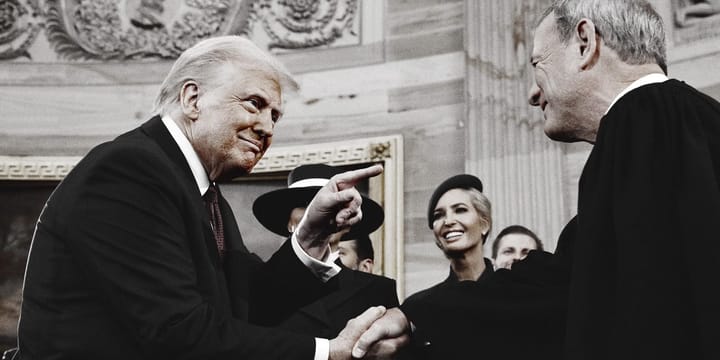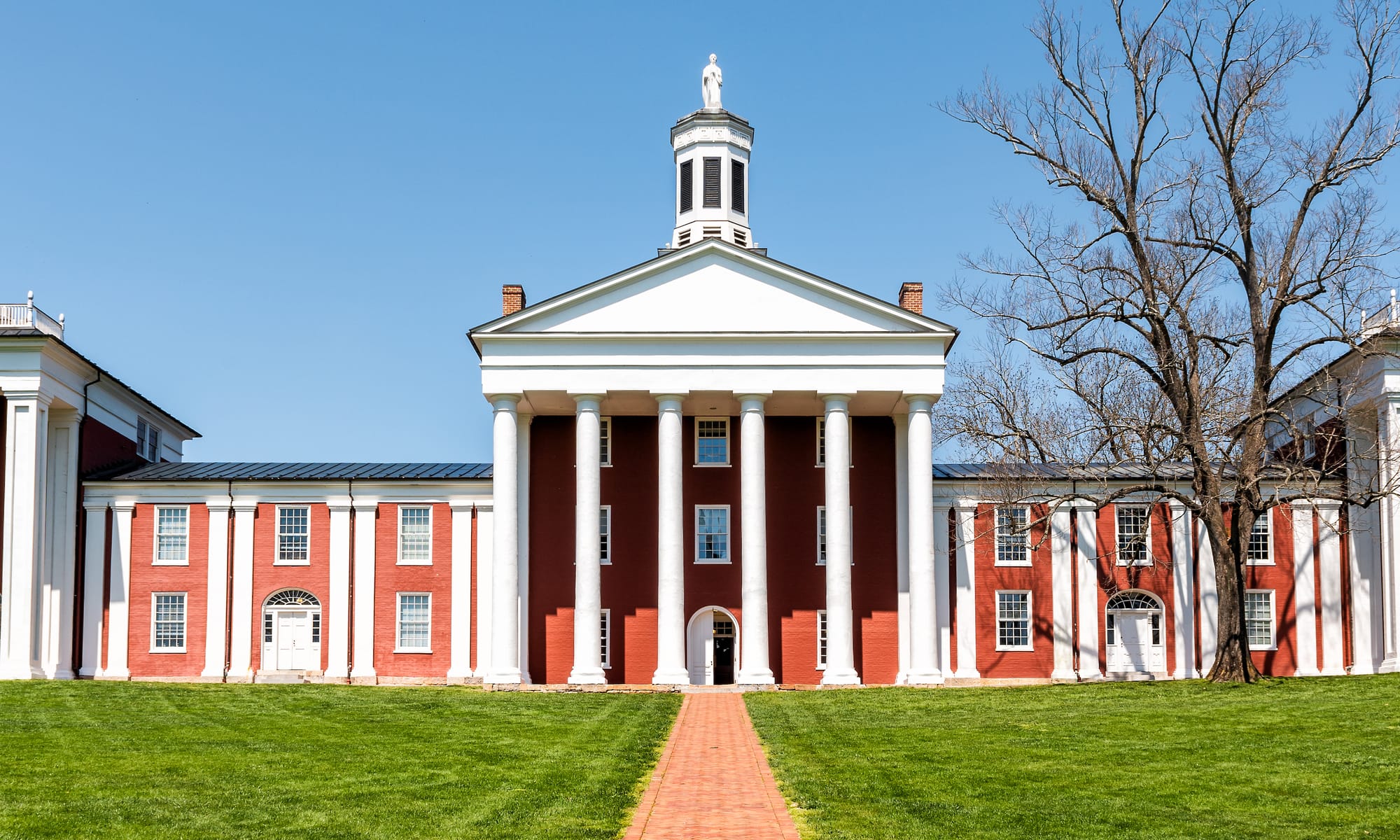We can't count on the Supreme Court
The umpire picked a side: how John Robert and the Supreme Court is enabling fascism.

As Ed Pilkington lays out in the Guardian, the Supreme Court has lost its democratic mooring. They are with the fascism.
When Donald Trump thanked Chief Justice John Roberts after his 100-minute congressional address in March, observers wondered what prompted such gratitude. The answer has become clear. Roberts has since presided over the systematic dismantling of America's legal guardrails. All, in the service of Trump. The cour has enabled a move to authoritarianism with unprecedented judicial acquiescence.
They are what we feared.
The shadow docket strangles democracy
In the past few months, the Supreme Courts granted Trump an extraordinary 18 consecutive victories on emergency relief requests. These decisions haven't come through normal judicial processes with public debate and deliberation. Instead, they've emerged from the court's "shadow docket." This is a secretive arena where momentous decisions affecting millions of lives are made at breakneck speed, often without explanation. And it sucks.
Seven of these orders came with no justification whatsoever, leaving Americans in the dark about the court's reasoning. This isn't just poor transparency—it's the hallmark of authoritarian governance, where power is exercised without accountability or public scrutiny.
Seven of these orders came with no justification whatsoever, leaving Americans in the dark about the court's reasoning. This isn't just poor transparency—it's the hallmark of authoritarian governance, where power is exercised without accountability or public scrutiny.
The human cost of these shadow rulings is staggering. Federal employees with decades of loyal service can now be fired at whim. Transgender service members face military purges. Over one million people from Venezuela, Haiti, Cuba, and other nations are being stripped of their legal status. Immigrants are being deported to war-torn countries where their lives hang in the balance.
Rewarding lawlessness
What makes Roberts's this dangerous is that he's not just supporting conservative policies—he's legitimizing outright lawlessness.
Supreme Court scholar Steve Vladeck has documented how the court is approving "a truly unprecedented amount of lawlessness by the executive branch." Justice Sonia Sotomayor has repeatedly warned in dissenting opinions that her conservative colleagues are "rewarding lawlessness" and undermining the foundational principle that America is a "government of laws, not of men."
Trump hasn't merely pushed legal boundaries—he's obliterated them. His administration has:
- Violated the 1974 Impoundment Control Act by withholding congressionally approved funds
- Ignored constitutional birthright citizenship protections
- Defied federal court orders on deportations
- Fired federal commissioners without legal cause, usurping Congress's authority
And let's not forget emoluments.
The most chilling example: Trump's administration has deported individuals to dangerous third countries in direct defiance of federal judges who explicitly forbade such actions. Under international law, deporting people to places where they face torture is prohibited. Yet Roberts's court has turned a blind eye.
Reading a 30s playbook
Roberts's judicial philosophy reveals a disturbing pattern that mirrors classic authoritarian tactics. Throughout his career, from his early days in the Reagan administration to his current role, he has consistently championed executive power while undermining institutional checks and balances.
His Reagan-era memos read like an authoritarian manifesto. He lambasted government officials who dared challenge presidential authority—eerily similar to Trump's war on the "deep state." Ranting of a senile mind. Cover that please.
He railed against civil rights protections and affirmative action programs. Most tellingly, he criticized federal judges for "unwarranted interference" in executive affairs. Today, his court routinely overturns lower court rulings that attempt to constrain Trump's lawless behavior.
The culmination of this philosophy was Roberts's authorship of Trump v. US, the devastating ruling that granted presidents absolute immunity for "official acts." This decision didn't just shield Trump from accountability for January 6th—it sent a signal that presidents are above the law. Legal expert Lisa Graves argues this ruling "paved the way for Trump's return" by suggesting "he could do no wrong."
Welcome to the American reich.
Ronald Reagan was the devil. He is why we are in this moment. Had Carter won in 1980, just imagine that. A decent man.
Checks balances go to hell
What's particularly alarming is Roberts's willingness to undermine the federal judiciary itself. When lower court judges try to uphold the law against Trump's violations, Roberts's court consistently sides with the executive. This represents a fundamental breakdown of the separation of powers that forms the backbone of democratic governance.
Federal appellate judge J. Michael Luttig, Roberts's longtime friend and wedding groomsman, has watched this transformation with horror.
That message is unmistakable. Institutional norms, congressional authority, and even direct court orders mean nothing when they conflict with presidential power.
Foregoing the slip for an out and out hood
For two decades, Roberts cultivated an image as a moderate institutionalist. His famous "umpires don't make the rules" confirmation hearing performance convinced many he would be an impartial arbiter. But this carefully constructed persona has proven to be exactly that—a performance.
The mask has slipped completely under Trump's second term. While Roberts was willing to block modest student loan relief under Biden, citing executive overreach, he now greenligths Trump's wholesale violation of federal law. This isn't principled conservatism—it's partisan authoritarianism dressed in judicial robes.
Enabling fascism it the current line.
Democracy's last line of defense fails
Roberts was supposed to be democracy's final bulwark against authoritarian overreach. The Supreme Court's role as the ultimate guardian of constitutional law makes its capitulation especially devastating. When the highest court in the land abandons the rule of law, there are no institutional safeguards left.
Legal expert Amrit Singh captures the gravity of the moment:
Are we at the point of no return?
We all hope that Roberts will reassert judicial independence on major constitutional questions. But the damage is already done. By systematically legitimizing lawlessness through shadow docket rulings, Roberts has normalized authoritarian governance.
Every ignored court order, every fired federal employee (full disclosure my friends), every unconstitutional deportation weakens the institutional foundations of American democracy. These aren't temporary setbacks—they're precedents that future authoritarians will cite and expand upon.
Roberts's transformation from self-proclaimed umpire to Trump's judicial enabler represents more than hypocrisy—it's a betrayal of the constitutional order he swore to protect. In his pursuit of executive supremacy, the Chief Justice has become the architect of America's democratic collapse, one shadow docket ruling at a time.
If we do regain power. Pack the court. Or just ignore their BS.
Non in cautus futuri.

